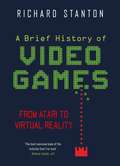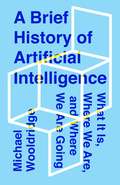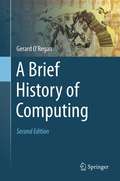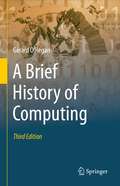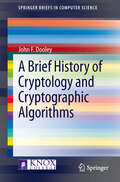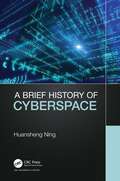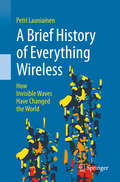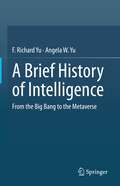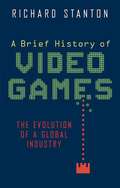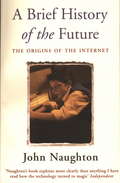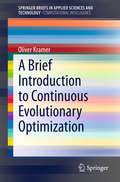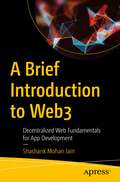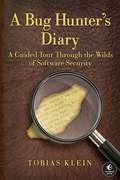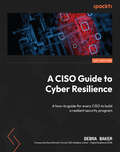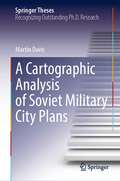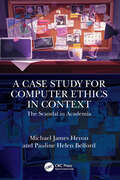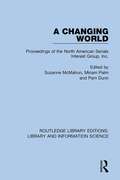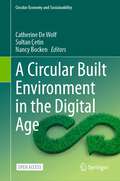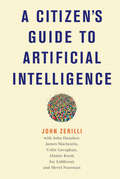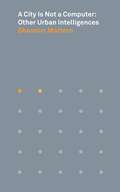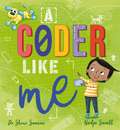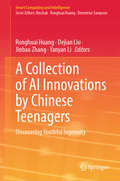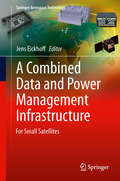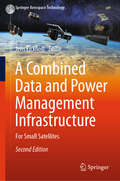- Table View
- List View
A Brief History Of Video Games: From Atari to Virtual Reality (Brief Histories)
by Rich Stanton'Stanton writes with terrific verve and precision . . . his understanding of the seductive pleasures of gaming takes us right to its heart.'Maria Bustillos, Times Literary Supplement'The best overview book of the industry that I've read.'Andrew Liptak, io9From the first wood-panelled Pong machines in California to the masterpieces of engineering that now sit in countless homes all over the world, A Brief History of Video Games reveals the vibrant history and culture of interactive entertainment. Above all, this is a book about the games - how the experience of playing has developed from simple, repetitive beginnings into a cornucopia of genres and styles, at once utterly immersive and socially engaging. With full-colour illustrations throughout, it shows how technological advances have transformed the first dots and dashes of bored engineers into sophisticated, responsive worlds that are endlessly captivating. As thrilling and surprising as the games it describes, this is an indispensable read for anyone serious about the business of having fun.
A Brief History of Artificial Intelligence: What It Is, Where We Are, and Where We Are Going
by Michael WooldridgeFrom Oxford's leading AI researcher comes a fun and accessible tour through the history and future of one of the most cutting edge and misunderstood field in science: Artificial IntelligenceThe somewhat ill-defined long-term aim of AI is to build machines that are conscious, self-aware, and sentient; machines capable of the kind of intelligent autonomous action that currently only people are capable of. As an AI researcher with 25 years of experience, professor Mike Wooldridge has learned to be obsessively cautious about such claims, while still promoting an intense optimism about the future of the field. There have been genuine scientific breakthroughs that have made AI systems possible in the past decade that the founders of the field would have hailed as miraculous. Driverless cars and automated translation tools are just two examples of AI technologies that have become a practical, everyday reality in the past few years, and which will have a huge impact on our world.While the dream of conscious machines remains, Professor Wooldridge believes, a distant prospect, the floodgates for AI have opened. Wooldridge's A Brief History of Artificial Intelligence is an exciting romp through the history of this groundbreaking field--a one-stop-shop for AI's past, present, and world-changing future.
A Brief History of Computing
by Gerard O'ReganThis lively and fascinating text traces the key developments in computation - from 3000 B.C. to the present day - in an easy-to-follow and concise manner. Topics and features: ideal for self-study, offering many pedagogical features such as chapter-opening key topics, chapter introductions and summaries, exercises, and a glossary; presents detailed information on major figures in computing, such as Boole, Babbage, Shannon, Turing, Zuse and Von Neumann; reviews the history of software engineering and of programming languages, including syntax and semantics; discusses the progress of artificial intelligence, with extension to such key disciplines as philosophy, psychology, linguistics, neural networks and cybernetics; examines the impact on society of the introduction of the personal computer, the World Wide Web, and the development of mobile phone technology; follows the evolution of a number of major technology companies, including IBM, Microsoft and Apple.
A Brief History of Computing
by Gerard O'ReganThis lively and fascinating text traces the key developments in computation – from 3000 B.C. to the present day – in an easy-to-follow and concise manner. Topics and features: ideal for self-study, offering many pedagogical features such as chapter-opening key topics, chapter introductions and summaries, exercises, and a glossary; presents detailed information on major figures in computing, such as Boole, Babbage, Shannon, Turing, Zuse and Von Neumann; discusses the earliest computers developed in the United States, Germany and Britain; discusses the development of the IBM 360 family of computers and its importance; discusses the invention of the transistor and integrated circuit; discusses the birth of the software industry and the evolution of human-computer interaction; reviews the history of programming languages, operating systems and software engineering; discusses the progress of artificial intelligence; discusses the invention of the microprocessor and the development of home and personal computers; examines the impact on society of the introduction of the personal computer, the World Wide Web, and the development of mobile phone technology; discusses smart phones and social media and the challenge of fake news; reviews a miscellany of innovations in the computing field such as cloud computing, the Internet of Things, and Quantum Computing; discusses legal aspects of computing and the professional responsibilities of computer professionals.
A Brief History of Cryptology and Cryptographic Algorithms (SpringerBriefs in Computer Science)
by John F. DooleyThe science of cryptology is made up of two halves. Cryptography is the study of how to create secure systems for communications. Cryptanalysis is the study of how to break those systems. The conflict between these two halves of cryptology is the story of secret writing. For over 2,000 years, the desire to communicate securely and secretly has resulted in the creation of numerous and increasingly complicated systems to protect one's messages. Yet for every system there is a cryptanalyst creating a new technique to break that system. With the advent of computers the cryptographer seems to finally have the upper hand. New mathematically based cryptographic algorithms that use computers for encryption and decryption are so secure that brute-force techniques seem to be the only way to break them - so far. This work traces the history of the conflict between cryptographer and cryptanalyst, explores in some depth the algorithms created to protect messages, and suggests where the field is going in the future.
A Brief History of Cyberspace
by Huansheng NingWith the widespread growth of the Internet, a new space – cyberspace – has appeared and has rapidly been integrated into every facet of life and work. It has effectively become the fourth basic living space for human beings. Although cyberspace has become a topic of increasing widespread concern, it is still difficult to understand cyberspace well because of its many definitions, vast and varied content, and differences with other similar spaces. A Brief History of Cyberspace attempts to establish a complete knowledge system about the evolution and history of cyberspace and cyber-enabled spaces (i.e., cyber-enabled physical space, cyber-enabled social space, and cyber-enabled thinking space). By providing a comprehensive overview, this book aims to help readers understand the history of cyberspace and lays a solid foundation for researchers and learners who are interested in cyberspace. The book has three main objectives: To provide a comprehensive understanding of the development of cyberspace, ranging from its origin, evolutions, and research status to open issues and future challenges, as well as related hot topics in industry and academia. To examine cyber life, cyber syndrome, and health in addition to cyber-enabled spaces designed for better living. To describe cyberspace governance from the perspective of the individual, society, and national and international levels in order to promote a more profound and reasonable direction to the development of cyberspace. Consisting of 16 chapters, the book is divided into three parts. Chapter 1 introduces the origins and basic concept of cyberspace, cyber philosophy, and cyber logic to help readers have a general understanding of cyberspace. Chapters 2 through 7 discuss a wide variety of topics related to human behavior, psychology, and health to help people better adapt to cyberspace. Chapters 8 through 16 present the history of cyberspace governance and various social and culture aspects of cyberspace. Each chapter concludes with a discussion of future development.
A Brief History of Everything Wireless: How Invisible Waves Have Changed the World
by Petri LauniainenSince the discovery of electromagnetic waves less than 150 years ago, the application of wireless communications technology has not only revolutionized our daily lives, but also fundamentally changed the course of world history.A Brief History of Everything Wireless charts the fascinating story of wireless communications. The book leads the reader on an intriguing journey of personal triumphs and stinging defeats, relating the prominent events, individuals and companies involved in each progressive leap in technology, with a particular focus on the phenomenal impact of each new invention on society. Beginning at the early days of spark-gap transmitters, this tale touches on the emergence of radio and television broadcasting, as well as radio navigation and radar, before moving on to the rise of satellite, near-field and light-based communications. Finally, the development of wireless home networks and the explosive growth of modern cellular technologies are revealed, complete with a captivating account of their corresponding company histories and behind-the-scenes battles over standards.For those wishing to peek behind the magic curtain of friendly user interfaces and clever engineering, and delve further into various processes underlying the ubiquitous technology we depend upon yet take for granted, the book also contains special “TechTalk” chapters that explain the theoretical basics in an intuitive way.
A Brief History of Intelligence: From the Big Bang to the Metaverse
by F. Richard Yu Angela W. YuThis book introduces a variety of intelligence phenomena starting from the birth of the universe, including intelligence in physics, intelligence in chemistry, intelligence in biology, intelligence in humans and intelligence in machines. It uncovers the mystery of intelligence to the world and explores the natural phenomenon of intelligence. If understanding intelligence is regarded as a journey of a thousand miles, then this book is the first step to try. In the process of studying the phenomenon of intelligence and the nature of intelligence, our eyes cannot be limited to human intelligence. Instead, one should put our vision beyond human intelligence, consider different things in the universe, reach a new level, and study and explore the phenomenon of intelligence and the essence of intelligence on a new level.By looking at the various phenomena of intelligence since the birth of the universe, readers can see that intelligence is a natural phenomenon, similar to other natural phenomena (e.g., the rolling of rocks and the melting of snow and ice). These phenomena occur to facilitate the stability of the universe, and the phenomenon of intelligence is no exception. The book is divided into 10 chapters, covering matter, energy and space in the origin of the universe, gravity in physics, the principle of least action, dissipative structures in chemistry, entropy increase, maximum entropy production, the definition of life, the emergence of life, the intelligence in plants, the intelligence in animals, the neocortex structure of the brain, the special thinking of human beings, the theory of the brain, artificial intelligence symbolism, connectionism, behaviorism, artificial general intelligence, metaverse, etc.This book can be used as a reference for students and researchers working in the artificial intelligence areas. It is also positioned as a popular science book interested in intelligent phenomena.
A Brief History of Video Games
by Richard StantonThis Brief History provides a unique look at the history and culture of video games, starting with the 1960s classics like Pong to modern favorites such as Grand Theft Auto V and Bioshock. Focusing on creative and scientific advances between 1962 and today, A Brief History of Video Games offers a global perspective on gaming's past and its cutting-edge future with the evolution of virtual reality, 3D graphics, and thought-interface technology. It also addresses the design process from concept to packaging, considers the influence of manga and anime, and explores the relationship between video games and movies.
A Brief History of the Future
by John NaughtonThe Internet is the most remarkable thing human beings have built since the Pyramids. John Naughton's book intersperses wonderful personal stories with an authoritative account of where the Net actually came from, who invented it and why and where it might be taking us. Most of us have no idea how the Internet works, or who created it. Even fewer have any idea what it means for society and the future. In a cynical age, John Naughton has not lost his capacity for wonder. He examines the nature of his own enthusiasm for technology and traces its roots in his lonely childhood and in his relationship with his father. A Brief History of the Future is an intensely personal celebration of vision and altruism, ingenuity and determination and, above all, of the power of ideas, passionately felt, to change the world.
A Brief Introduction to Continuous Evolutionary Optimization (SpringerBriefs in Applied Sciences and Technology)
by Oliver KramerPractical optimization problems are often hard to solve, in particular when they are black boxes and no further information about the problem is available except via function evaluations. This work introduces a collection of heuristics and algorithms for black box optimization with evolutionary algorithms in continuous solution spaces. The book gives an introduction to evolution strategies and parameter control. Heuristic extensions are presented that allow optimization in constrained, multimodal and multi-objective solution spaces. An adaptive penalty function is introduced for constrained optimization. Meta-models reduce the number of fitness and constraint function calls in expensive optimization problems. The hybridization of evolution strategies with local search allows fast optimization in solution spaces with many local optima. A selection operator based on reference lines in objective space is introduced to optimize multiple conflictive objectives. Evolutionary search is employed for learning kernel parameters of the Nadaraya-Watson estimator and a swarm-based iterative approach is presented for optimizing latent points in dimensionality reduction problems. Experiments on typical benchmark problems as well as numerous figures and diagrams illustrate the behavior of the introduced concepts and methods.
A Brief Introduction to Web3: Decentralized Web Fundamentals for App Development
by Shashank Mohan JainJourney into the world of Web3-based application development, its related protocols, and its usage in developing decentralized applications. This book will explain how programmable blockchains are revolutionizing the world of web applications, which can be run on decentralized platforms or peer-to-peer networks like IPFS.You'll start with an introduction to decentralization with a focus on blockchain implementations like Ethereum and Bitcoin. You'll then learn to develop simple decentralized applications (dApps) using Solidity, the language used for developing apps with Ethereum as well as smart contracts, wallets, gateways and NFTs. This book also covers how security and scale are addressed by L2 networks for scaling Bitcoin and Ethereum blockchains. A Brief Introduction to Web3 is your go-to guide for setting up simple Web3 applications using the Ethereum blockchain programming model.What You Will Learn Build NFT tokensExamine Web3 differs from Web2-based applicationsUnderstand the fundamentals of blockchain and the corresponding data structures around itSee how consensus and trustless computing can be performed using blockchain Use Solidity and Truffle to build Web3 applications Who This Book Is For Software developers and architects who are looking to hone their skills in dApps and web3 applications developed on sound principles of decentralized computing.
A Bug Hunter's Diary
by Tobias Klein"Give a man an exploit and you make him a hacker for a day; teach a man to exploit bugs and you make him a hacker for a lifetime." A Bug Hunter's Diary follows security expert Tobias Klein as he tracks down and exploits bugs in some of the world's most popular software.
A CISO Guide to Cyber Resilience: A how-to guide for every CISO to build a resilient security program
by Debra BakerExplore expert strategies to master cyber resilience as a CISO, ensuring your organization's security program stands strong against evolving threatsKey FeaturesUnlock expert insights into building robust cybersecurity programsBenefit from guidance tailored to CISOs and establish resilient security and compliance programsStay ahead with the latest advancements in cyber defense and risk management including AI integrationPurchase of the print or Kindle book includes a free PDF eBookBook DescriptionThis book, written by the CEO of TrustedCISO with 30+ years of experience, guides CISOs in fortifying organizational defenses and safeguarding sensitive data. Analyze a ransomware attack on a fictional company, BigCo, and learn fundamental security policies and controls. With its help, you’ll gain actionable skills and insights suitable for various expertise levels, from basic to intermediate. You’ll also explore advanced concepts such as zero-trust, managed detection and response, security baselines, data and asset classification, and the integration of AI and cybersecurity. By the end, you'll be equipped to build, manage, and improve a resilient cybersecurity program, ensuring your organization remains protected against evolving threats.What you will learnDefend against cybersecurity attacks and expedite the recovery processProtect your network from ransomware and phishingUnderstand products required to lower cyber riskEstablish and maintain vital offline backups for ransomware recoveryUnderstand the importance of regular patching and vulnerability prioritizationSet up security awareness trainingCreate and integrate security policies into organizational processesWho this book is forThis book is for new CISOs, directors of cybersecurity, directors of information security, aspiring CISOs, and individuals who want to learn how to build a resilient cybersecurity program. A basic understanding of cybersecurity concepts is required.
A Cartographic Analysis of Soviet Military City Plans (Springer Theses)
by Martin DavisThe collapse of the Soviet Union has seen the emergence of its unprecedentedly comprehensive global secret military mapping project and the commercial availability of a vast number of detailed topographic maps and city plans at several scales. This thesis provides an in-depth examination of the series of over 2,000 large-scale city plans produced in secret by the Military Topographic Directorate (Военное топографическое управление) of the General Staff between the end of the Second World War and the collapse of the USSR in 1991. After positioning the series in its historical context, the nature and content of the plans are examined in detail. A poststructuralist perspective introduces possibilities to utilise and apply the maps in new contexts, which this thesis facilitates by providing a systematic, empirical analysis of the Soviet map symbology at 1:10,000 and 1:25,000, using new translations of production manuals and a sample of the city plans. A comparative analysis with the current OpenStreetMap symbology indicates scope for Soviet mapping to be used as a valuable supplementary topographic resource in a variety of existing and future global mapping initiatives, including humanitarian crisis mapping. This leads to a conclusion that the relevance and value of Soviet military maps endure in modern applications, both as a source of data and as a means of overcoming contemporary cartographic challenges relating to symbology, design and the handling of large datasets.
A Case Study for Computer Ethics in Context: The Scandal in Academia
by Michael James Heron Pauline Helen BelfordAimed at addressing the difficulties associated with teaching often abstract elements of technical ethics, this book is an extended fictional case study into the complexities of technology and social structures in complex organizations. Within this case study, an accidental discovery reveals that the algorithms of Professor John Blackbriar are not quite what they were purported to be. Over the course of 14 newspaper articles, a nebula of professional malpractice and ethical compromise is revealed, ultimately destroying the career of a prominent, successful academic.The case study touches on many topics relevant to ethics and professional conduct in computer science, and on the social structures within which computer science functions. Themes range from the growing influence of generative AI to the difficulties in explaining complex technical processes to a general audience, also touching on the environmental consequences of blockchain technology and the disproportionate gender impacts of Coronavirus. Each new revelation in the case study unveils further layers of complexity and compromise, leading to new technical and social issues that need to be addressed.Directly aimed at making ethics in the digital age accessible through the use of real-world examples, this book appeals to computer science students at all levels of the educational system, as well as making an excellent accompaniment to lecturers and course convenors alike.
A Changing World: Proceedings of the North American Serials Interest Group, Inc. (Routledge Library Editions: Library and Information Science #1)
by Suzanne McMahon Miriam Palm Pam DunnThis book, first published in 1993, examines how the newest technological developments in information storage and processing impact print-oriented libraries. Find answers to questions on how libraries can utilize the awesome speed, remarkable storage capacity, and universal access of the new technology. Authoritative contributors provide insight, inspirations, and practical experience to the three major areas of changing technologies, changing information worldwide, and strategies and responses of libraries to these rapid changes. A Changing World looks at the future of the electronic network medium and how it will provide opportunities for accessing and using information that so far have been unimagined by the print-dominated information industry. Enlightening chapters explore the feasibility of electronic serials as a realistic replacement for print journals, the future of automated serials control systems, and the effects of information technologies on libraries as systems and librarianship as a profession. Discover timely indications for ten-year trends of the globalization of research, scholarly information, and patents. Specific international influences on information are examined including the implications of the European Community internal market for scholarly publishing and distribution, the influence of rapid changes in Eastern Europe and the former Soviet Union on scholarly publishing, and scholarly information and serials in politically turbulent Latin American countries.
A China Business Primer: Ethics, Culture, and Relationships
by Michael A. Santoro Robert ShanklinThe COVID-19 pandemic underscored longstanding fissures in China’s business relationships with the West. If the West is going to develop a relationship of mutual trust and improve business relations with China in the coming decades, it is imperative to understand how to engage with Chinese thinking on ethics in business—this book explains how. Government officials, businesspeople, and business-ethicists have trouble communicating about issues in ethics, policy, and business across the China-West divide. This book shows how to overcome the us-versus-them mindset plaguing China-West relations by presenting to Western audiences an easy-to-understand yet deeply informed primer on core ideas and perspectives in Chinese cultural and philosophical thought. The book considers original texts of Chinese philosophy and religion, and applies principles from those writings to three business-ethics topics of enduring interest to business executives, government officials, and academics, namely, the protection of intellectual property, assurance of product safety and quality in the pharmaceutical supply chain, and human rights. This book is a must-read for those who want to forge constructive relationships with their Chinese counterparts based on mutual trust and understanding. The book is specifically relevant to business executives, but it should also be of interest to policymakers, educators, and students who seek to communicate more effectively with their Chinese counterparts, in particular about difficult and contentious business, policy, and ethical issues.
A Circular Built Environment in the Digital Age (Circular Economy and Sustainability)
by Catherine De Wolf Nancy Bocken Sultan ÇetinThis open access book offers a comprehensive exploration of the digital innovations that have emerged in recent years for the circular built environment. Each chapter is meticulously crafted to ensure that both academic readers and industry practitioners can grasp the inner workings of each digital technology, understand its relevance to the circular built environment, examine real-life implementations, and appreciate the intriguing business models behind them. Our primary objective is to blend scholarly knowledge with practical inspiration by providing real-life case studies for each innovation. The authors, who possess extensive expertise in their respective fields, have contributed chapters dedicated to digital technologies within their areas of specialization. The book is organized into three distinct parts. The first part focuses on data-driven digital technologies and delves into how their capabilities can facilitate the transition to a circular built environment. Essential aspects such as building information modeling (BIM), digital twins, geographical information systems (GIS), scanning technologies, artificial intelligence (AI), data templates, and material passports are explored as vital tools for data collection, integration, and analysis in the context of circular construction. In the second part, various digital technologies for design and fabrication are introduced. Topics covered include computational design algorithms, additive and subtractive manufacturing, robotic manufacturing, and extended reality. These discussions shed light on how these technologies can be leveraged to enhance design and fabrication processes within the circular built environment. Finally, the last part of the book presents emerging digital concepts related to business and governance. It explores the role of deconstruction and reverse logistics, blockchain technology, digital building logbooks, and innovative business models as enablers of circularity in the built environment. The book concludes with a chapter dedicated to digital transformation and its potential to propel the built environment towards a regenerative future. In addition to the substantive content, the book features forewords and perspectives from esteemed experts, providing valuable economic and creative insights to complement its comprehensive approach.
A Citizen's Guide to Artificial Intelligence
by John ZerilliA concise but informative overview of AI ethics and policy.Artificial intelligence, or AI for short, has generated a staggering amount of hype in the past several years. Is it the game-changer it's been cracked up to be? If so, how is it changing the game? How is it likely to affect us as customers, tenants, aspiring home-owners, students, educators, patients, clients, prison inmates, members of ethnic and sexual minorities, voters in liberal democracies? This book offers a concise overview of moral, political, legal and economic implications of AI. It covers the basics of AI's latest permutation, machine learning, and considers issues including transparency, bias, liability, privacy, and regulation.
A City Is Not a Computer: Other Urban Intelligences (Places Books #2)
by Shannon MatternA bold reassessment of "smart cities" that reveals what is lost when we conceive of our urban spaces as computersComputational models of urbanism—smart cities that use data-driven planning and algorithmic administration—promise to deliver new urban efficiencies and conveniences. Yet these models limit our understanding of what we can know about a city. A City Is Not a Computer reveals how cities encompass myriad forms of local and indigenous intelligences and knowledge institutions, arguing that these resources are a vital supplement and corrective to increasingly prevalent algorithmic models.Shannon Mattern begins by examining the ethical and ontological implications of urban technologies and computational models, discussing how they shape and in many cases profoundly limit our engagement with cities. She looks at the methods and underlying assumptions of data-driven urbanism, and demonstrates how the "city-as-computer" metaphor, which undergirds much of today's urban policy and design, reduces place-based knowledge to information processing. Mattern then imagines how we might sustain institutions and infrastructures that constitute more diverse, open, inclusive urban forms. She shows how the public library functions as a steward of urban intelligence, and describes the scales of upkeep needed to sustain a city's many moving parts, from spinning hard drives to bridge repairs.Incorporating insights from urban studies, data science, and media and information studies, A City Is Not a Computer offers a visionary new approach to urban planning and design.
A Coder Like Me
by Dr Shini SomaraEngaging illustrations and an empowering story combine to introduce young readers to the world of coding, computers and problem-solving.Curious Sam has lots of questions. What is an algorithm? Could a robot be instructed to walk a dog? What is artificial intelligence? A day spent with Auntie Jo turns into a fascinating lesson in coding for Sam! They discover that the world is full of clever computers, find out about the language they "speak" and the brilliant coders who have helped us to understand it. Maybe Sam can try out some awesome coding projects and become a coder too?With pages encouraging kids to try out coding for themselves and opening their minds to the fun things that can be created using computer code, this brilliant picture book written by engineer and TV presenter Dr Shini Somara unlocks a love of coding and computing and celebrates women in STEM.
A Collection of AI Innovations by Chinese Teenagers: Discovering Youthful Ingenuity (Smart Computing and Intelligence)
by Yanyan Li Ronghuai Huang Jinbao Zhang Dejian LiuThis book presents 10 artificial intelligence (AI) innovation projects by Chinese teenagers, including innovations on intelligent medical care, environmental protection, education, transportation, among others. It delves into the technical details of these innovations, providing readers with a comprehensive understanding of the concepts and technologies involved in each case. The book also discusses the challenges faced by young innovators and their approaches to overcome them, and serves as a valuable resource for readers interested in the practical applications of AI.
A Combined Data and Power Management Infrastructure: For Small Satellites (Springer Aerospace Technology)
by Jens EickhoffThis book describes the development and design of a unique combined data and power management infrastructure The use in small satellites gives some particular requirements to the systems like potential hardware failure robustness and handling of different types of external analog and digital interfaces. These requirements lead to a functional merge between On Board Computer and the satellite's Power Control and Distribution Unit, which results in a very innovative design and even a patent affiliation. This book provides system engineers and university students with the technical knowledge as mix between technical brochure and a user guide.
A Combined Data and Power Management Infrastructure: For Small Satellites (Springer Aerospace Technology)
by Jens EickhoffThis book describes the development and design of a unique combined data and power management infrastructure for small satellites. This new edition became necessary because in the frame of the system's impressive evolution from an academic prototype to one of today's most advanced core avionics, many elements were upgraded to their next technology generation and diverse new components complement the upgraded design. All elements are presented in updated respectively new chapters. This modular infrastructure was selected by the Swiss start-up ClearSpace SA for ESA's first mission ClearSpace-1 to remove space debris. Furthermore it is the baseline for the Thai national satellite development program and is used by an increasing number of universities worldwide for research studies.
